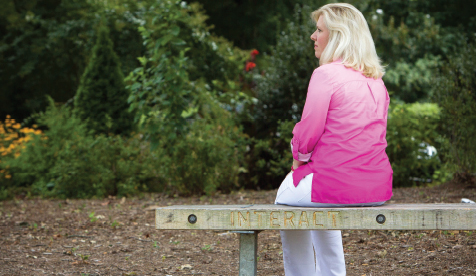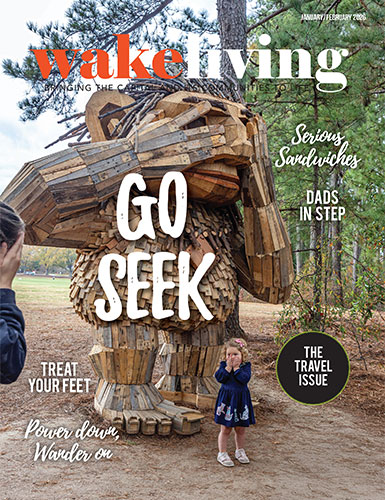Inside a lovely home, with her charming husband and two beautiful children, Jennifer kept a secret: She was living the cycle of domestic violence, and things were getting worse.
Her husband routinely threw things, punched walls and physically intimidated her, and kicked in a door during an argument.
“At certain points our marriage had gotten really tough, but we’d get through it,” Jennifer said. “That’s the cycle of domestic violence — the blowup, then the honeymoon. But that cycle started to get quicker. I started thinking ‘This isn’t normal.
“I didn’t want my marriage to fail,” she said. “What finally pushed me into saying ‘I’m done’ was when I was physically harmed. And after that, I could see all of the abuse that went before.”
For Ashley's survivor story, click here.
Help and hope for people like Jennifer and Ashley is found at InterAct, Wake County’s only dual-service agency serving victims and survivors of domestic and sexual violence.
Here, nine in-house partner agencies provide safety and a broad range of support for victims around the clock.
The need is real: In Wake County, an estimated 100,000 people have or will experience violence in their homes. Two county courtrooms are dedicated solely to domestic violence cases; in the past quarter alone, more than 1,000 individuals filed for domestic violence protective orders in Wake County.
In Raleigh, Cary and Morrisville, collaborative participation of the police departments and InterAct in a Lethality Assessment Program pilot found first-month results exceeded estimated victim numbers for the entire year.
Designed to put those in potentially lethal relationships into contact with a domestic violence agency, InterAct staff hope to expand the pilot to all 12 Wake municipalities and the sheriff’s department.
“We have to break the silence on these issues,” said InterAct Executive Director Leigh Duque. “This is everybody’s business.”
“Fundamentally, domestic violence is about power and control,” said Dr. Stephanie Francis, InterAct’s director of Volunteer & Intern Development. “Perpetrators use a number of different tactics to take and maintain that control: physical violence or the threat of, verbal or emotional abuse. When it starts it can be hard to identify. It can be subtle, but it escalates.
 “Domestic violence does not discriminate. It crosses age, race, education level, socio-economic level. Anybody can be a victim, or a perpetrator,” she said.
“Domestic violence does not discriminate. It crosses age, race, education level, socio-economic level. Anybody can be a victim, or a perpetrator,” she said.
Why do victims stay? That’s the wrong question, Francis says.
“It puts the responsibility on the victims to avoid being abused, not on the perpetrators to stop the abusive behavior,” she said. Finances are one barrier to leaving; domestic violence is a leading cause of homelessness.
“But the two most forgotten barriers are love and fear,” Francis said. “It’s easy outside the relationship to say ‘I would never,’ but these victims love their partners, and it’s hard to give up on them.
“Then there’s fear: Where will I go? How will I take care of the children?
“We work on how to leave safely, planning and talking about the specific situation, to figure out options and try to make the process as safe as possible,” she said. “It’s not telling them what to do, but empowering victims to decide.”
When Jennifer abruptly left her home situation, InterAct’s court advocate helped her navigate the important process of obtaining a protective order against her husband. He violated the order within 24 hours, resulting in his arrest.
“Later, my biggest concern was for my 4-year-old,” Jennifer said. “I wasn’t sure what he understood about what was happening. He and I went to InterAct for separate counseling. It was fantastic to talk to someone who could help with the rollercoaster of emotions. I still cared about my husband and what was happening to him. There was no judgment, and they helped me understand the wheel of power and control.”
Help for children is crucial, Francis says: Without interventional services, a child who witnesses violence in the home, even if not the direct target, is 1,000 times more likely to be a perpetrator or victim in adulthood.
In 2012, InterAct served 8,350 direct victims of domestic violence, including 300 in its 45-bed residential shelter program, maintained in a secure and undisclosed location for safety.
In an intensive eight- to 12-week program, residents build practical and emotional skills, and can continue counseling after leaving the shelter.
InterAct and its community collaborators also provide physical and mental health care, substance abuse counseling, budgeting and job training, legal assistance and afterschool programs.
“This is to help victims not just survive the immediate crisis, but to offer a continuum of services toward self-sufficiency,” said Duque. “It’s a personal and economic empowerment program.”
Jennifer, now a seven-year survivor of domestic violence, has remarried and her children are doing well. She’s also an InterAct volunteer and board member.
“I came from a loving home, went to college and grad school, have a good job. If it happened to me, it could happen to anyone,” Jennifer said. “It’s happening right here, to our neighbors, our co-workers and friends. As a community, we have to be willing to talk about it.”
She’s proof that healing does happen.
“The reason we call them ‘survivors’ is their strength and determination, and how much they’re doing to work through the process and protect themselves and their children,” Francis said.
“Just to make that phone call, or walk in, is a huge step. And sometimes we’re fortunate to see them go from point A to Z, get a job or their own place, or share our number with a friend. Others get to a point in their lives where they’re ready to give back, and volunteer.”
“I became a survivor as soon as I got out of the situation,” Jennifer said. “The first time I told my story was a point of survivorship too.
“God doesn’t waste a hurt; that’s why I volunteer. I feel strongly that my purpose is to take something traumatic and painful and turn it into something productive.
“It makes me sad that anyone would be in a relationship that doesn’t uplift them. When I compare the love, respect and thoughtfulness of my new husband, that anybody accepts less pains me,” she said.
“Please know you’re not alone — there are people who care and want to help. You don’t deserve to be mistreated, no matter what. Reach out and take that bold step to ask for help.”
InterAct, Raleigh
www.interactofwake.org;
see site for events marking October as National Domestic Violence Awareness Month
Pass It On Thrift Store & More,
Fuquay-Varina
(919) 557-8020







